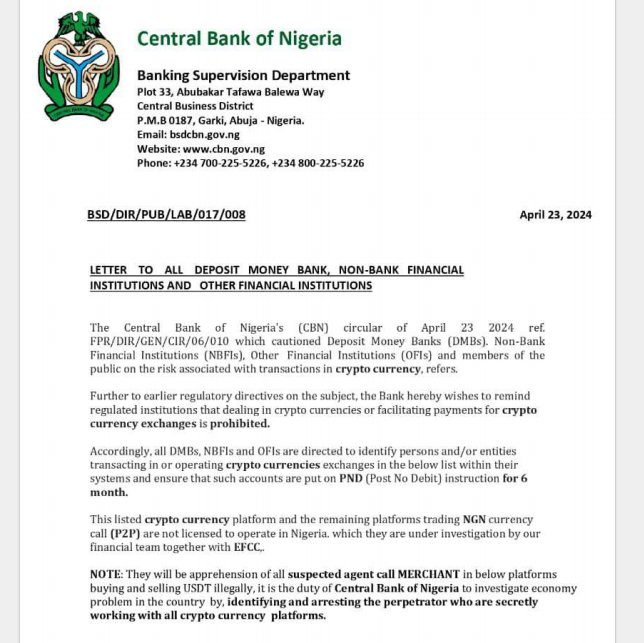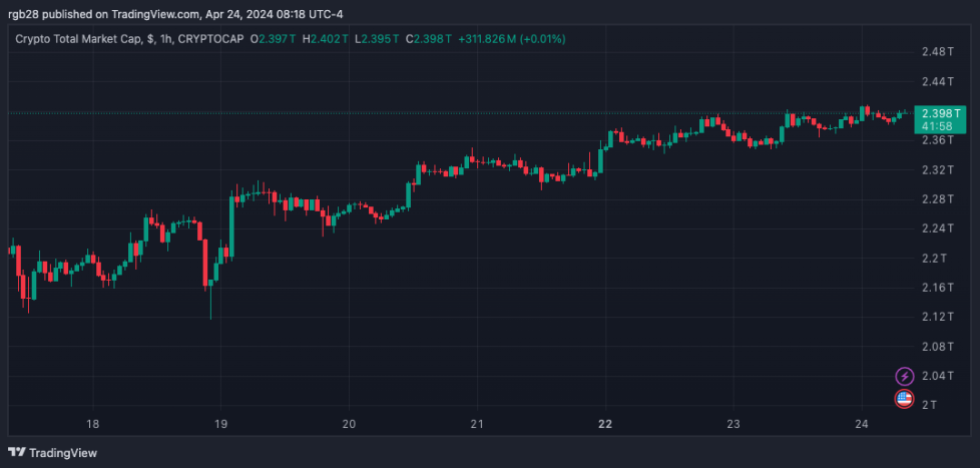Recent reports pointed to a purported circular issued by the Central Bank of Nigeria (CBN). The document warns financial institutions that it is prohibited to use cryptocurrencies and facilitate cryptocurrency exchange operations.
The news rang alarm bells because four months ago Nigeria survey the ban that prevented banks and other financial institutions from opening accounts for virtual asset service providers (VASP).
The latest crypto crackdown proved a bluff
On Tuesday, reports of a CBN attack on financial institutions that facilitated crypto exchange operations in Nigeria began to spread.
The so-called circular “warned” deposit money banks (DMBs), non-bank financial institutions (NBFIs), other financial institutions (OFIs), and the public of the risks associated with crypto transactions.

Alleged circular by the Central Bank of Nigeria. Source: X
The document “reminds” regulated institutions that they are prohibited from trading cryptocurrencies or facilitating exchange transactions due to “previous regulatory guidance on the subject.”
Nevertheless, the mentioned ban was lifted in December 2023 and was follow up by strict guidelines that allow banks and other institutions to deal with cryptocurrencies according to a set of rules.
The purported circular directed DMBs, NBFIs and OFIs to identify and report all individuals and entities within their system that were “transacting or mining cryptocurrencies” on the exchanges.
Binance, OKX, KuCoin and Bybit have been listed as banned platforms. According to the document, listed exchanges and other platforms trading Nigerian naira in the Peer-to-Peer (P2P) market were not allowed to operate in the country.
As such, these platforms were “under investigation” by the CBN and the Economic and Financial Crimes Commission (EFCC). The circular ordered financial institutions to ensure that accounts dealing with cryptocurrencies are “put under PND (Post No Debit) instruction for six months”.
Furthermore, he warned that any suspected agents who illegally traded “USDT” could be apprehended. The document stated that any violation of the new directive would result in “severe regulatory sanctions” for the parties involved.
However, the Central Bank of Nigeria clarified on Wednesday that the purported circular was “false content”. On a MessageCBN said the information was not authentic and did not come from the institution.
Nigeria’s EFCC freezes 300 accounts
Although the CBN circular was found to be false, the EFCC recently froze over 300 illegal Forex accounts trading on a P2P platform.
According to a local report On Tuesday, EFCC Chairman Ola Olukoyede revealed that the commission suspended the accounts on Monday following a court order.
The president explained that the agency uncovered a “worse scheme” than Binance’s system, which is the subject of a regulatory crackdown in the country. The world’s largest crypto exchange and two of its executives are currently facing four charges for tax evasion in Nigeria.
According to the report, Olukoyede claimed that “there are people in this country doing worse than Binance.” Accordingly, these measures were taken to “ensure the security of the foreign exchange market and protect the economy”.
The EFCC considers P2P financial trading a “scheme” operating outside official financial corridors since, last year, more than 15 billion Nigerian naira, worth about $11 million, passed through one of the exchange platforms.
Crypto Total Market Cap sits at $2.3 trillion. Source: TOTAL on TradingView
Featured image from freepik.com, graphic from TradingView.com



